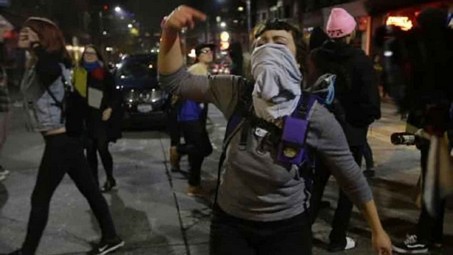Can College Students Learn to Disagree?
The importance of contrasting ideology with prudence.
Recently, conservative author Ann Coulter canceled a speech at UC Berkeley because of Berkeley’s ham-handed response to radical students’ threats. In February, Berkeley had been the scene of violent riots that prevented a Breitbart News editor, Milo Yiannopoulos, from speaking. Berkeley is the nation’s leading public university, according to US News, and ironically, it was the birthplace of the free-speech movement of the 1960s.
Berkeley professor and former secretary of labor Robert Reich has concocted a conspiracy theory that avers that Yiannopoulos himself was responsible for the riots. However, Reich needs to explain how the supposed conspiracy has traveled back and forth between Berkeley, California and Middlebury, Vermont, where in early March rioting students physically injured Professor Allison Stanger, who was accompanying IQ expert Charles Murray to his car after demonstrators prevented him from speaking.
Fox News has reported that in anticipation of further riots, police from 40 schools have taken part in special response training.
Despite ongoing campus intolerance and violence, over the past few weeks I have participated in campus debates and discussions at Brooklyn College, where I teach, and at Lafayette College, where I gave an invited talk as part of the Wilson lecture series. Both institutions are dominated by left-oriented faculty and students, yet the interactions that I witnessed were respectful, collegial, and enlightening.
At Brooklyn College I have run a lecture series funded by the John Templeton Foundation and administered by the Institute for Humane Studies. My speakers have included Donald Trump’s executive vice president, George H. Ross, who was co-star of The Apprentice; Mark Mix, the president of the National Right to Work Committee; and two economists, Oren Levin-Waldman and William T. Alpert, respectively of Metropolitan College and the University of Connecticut, who took different positions on the minimum wage issue. Students who are critical of Trump, who are opposed to the activities of the National Right to Work Committee, and who are in favor of a minimum wage were able to debate vigorously, rationally, and respectfully both with the speakers and with each other.
At Lafayette, I discussed my research findings concerning the preponderance of Democratic and left-oriented faculty in elite universities. Both left-oriented and conservative students debated with me and each other in a lengthy question-and-answer session. All three of the Brooklyn College events as well as the Lafayette event went overtime, and the students expressed enthusiasm for ideas without rancor.
What’s the difference? Why are elite institutions like Berkeley and Middlebury ridden with intolerant extremism and violence, with a leading faculty member attempting to rationalize such violence with a conspiracy theory?
While at Brooklyn and Lafayette isolated faculty members have encouraged tolerant discussion, elite universities increasingly lack a single dissenting faculty member. For example, history departments are imbued with identity politics through programs like gender studies, ethnic studies, and peace studies. Historians who do not voice support to the ideologies advocated in such programs increasingly are not permitted to teach or publish research. The result is that the ratio of Democrats to Republicans in elite history departments is now 35 to 1.

In a study I did with Daniel B. Klein and Anthony Quain, we found that 66 of 170 elite social science departments have no Republicans at all. With respect to race, research has shown that social interactions with people from different backgrounds reduce prejudice.
The same is likely true of political prejudice, but university faculty work in politically segregated environments. Today, interracial marriages are more common than inter-party marriages, and the most common venue for interaction with people from a different party is the workplace—a source of tolerance-enhancing desegregation, which is unavailable to elite academics.
Conservative social philosopher Russell Kirk discusses the word ideology in his 1993 book Politics of Prudence. Kirk explains that ideology inverts religion in its most fanatical and intolerant forms. Ideology is diametrically opposite to what should be the mission of higher learning: the uncovering of truth. It instead offers seemingly exciting ideals to students who have been taught that morality is relative. It is no less morally charged than traditional forms of morality, but its sacred commandments reflect political aims: Thou shalt not utter words that wound; thou shalt not be offensive to the left; thou shalt advocate equality of results; thou shalt not advocate religious faith.
Kirk contrasts ideology with prudence, with the understanding that compromise is fundamental to political exchange. Because republics are inevitably home to different viewpoints, they require balance of alternative views, or the republic will not adhere.
Hence, while prudence leads to a stable republic, ideology leads to bitter factional disputes. As they become more extreme, ideologies become more entwined in violence. Kirk echoes philosopher Alasdair MacIntyre, who argues in his book After Virtue that shared communities are prerequisites for reasonable dispute, and without a shared community or standard, morality devolves into nihilism, into shrill narcissistic advocacy of moral opinion. This we are witnessing on America’s left-oriented campuses.
In explaining my guest lecture series to my students, I encouraged them to respectfully debate with Mark Mix and the other speakers; in fact, Mix convinced many of them of the advantages of right-to-work laws.
Professor Brandon Van Dyck of Lafayette, who has been working with Heterodox Academy and has established the Mill lecture series, has also encouraged his students to engage in respectful debate. In bringing scholars with alternative views to Lafayette, Van Dyck engages his students to practice a collaborative, problem-solving approach to debate. His complaint that too few left-oriented faculty have been willing to participate in the Mill series illustrates the effects of ideology: an unwillingness to engage those with whom we disagree. Much as racists of the past would not associate with Jews or Blacks, so do today’s campus leftists refuse to associate with more moderate academics.
The development of what Kirk calls a prudent mindset is fundamental to the flourishing of research in universities. Michael Polanyi uses the metaphor of a republic to depict how science ideally functions—as a marketplace of ideas in which findings are coordinated through a voluntary, spontaneous order that results from open debate. The anemia of public policy debate on campus reflects a more fundamental scientific anemia in the social sciences and in philosophy, in which views alternative to Progressivism have increasingly been excluded.
The recent violence and intolerance on campus follows decades of ideological proselytizing in history, the humanities, and the social sciences. The recent violence reflects a fundamental breakdown in the purpose and function of higher education, and the best efforts of a few reformers may not be enough.




